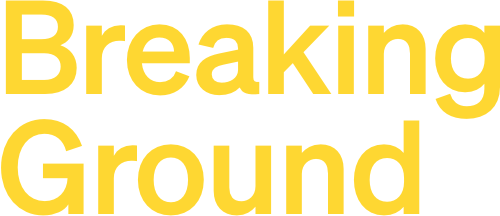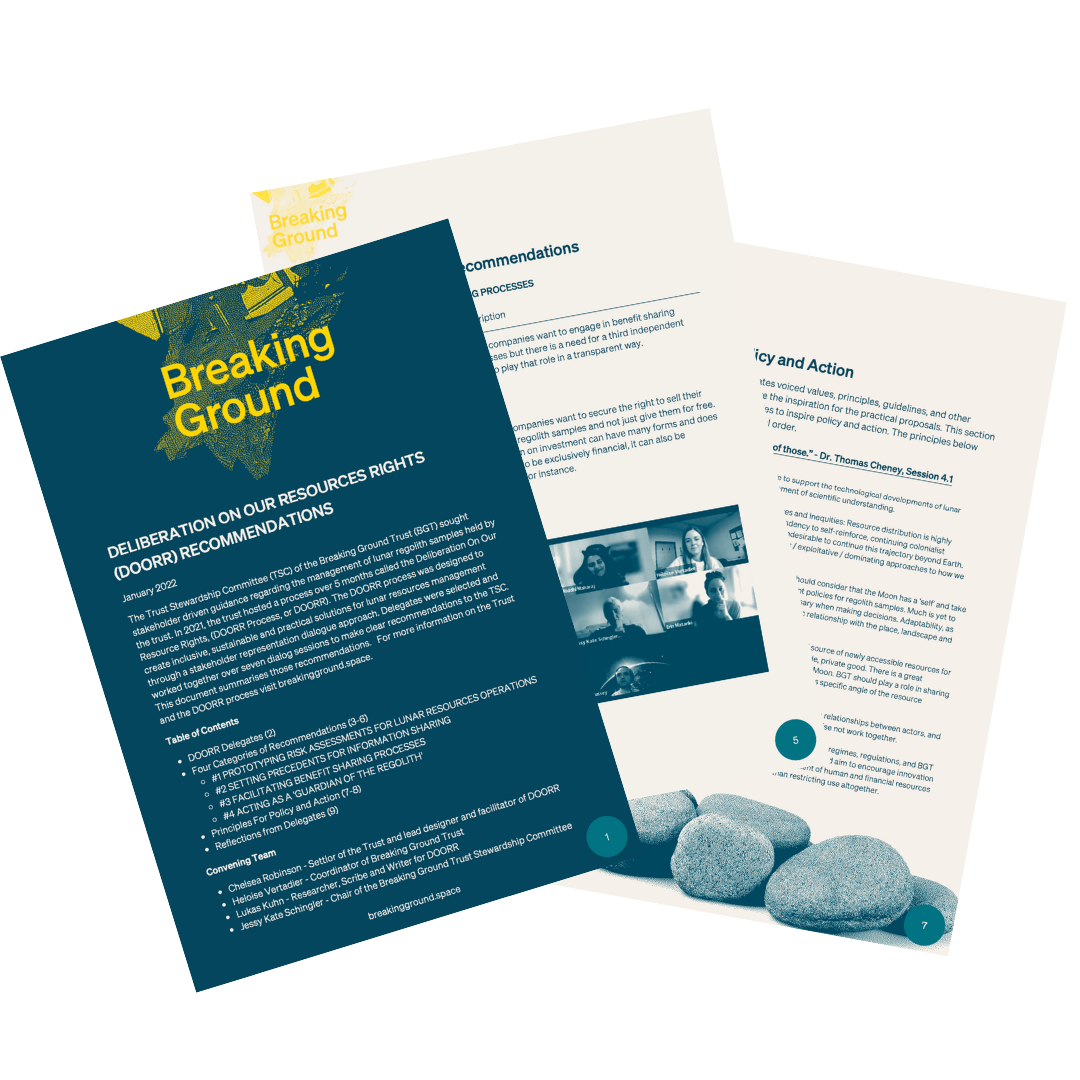
Deliberation On Our Resources Rights
Modelling balanced, multistakeholder expert governance of space resources.
Recommendations for managing lunar resources held by the Trust.
Eleven delegates worked together over 5 months to align on evidence based approaches for resource governance. The recommendations inform the activities of the Breaking Ground Trust.
Read the Recommendations
Read the Response from the Trust Stewardship Committee
Further Context:
The DOORR process was designed to create inclusive, sustainable and practical solutions for lunar resources management through a stakeholder representation dialogue approach. The work that DOORR produced through these deliberations is helping define Breaking Ground’s position regarding lunar resource management.
Breaking Ground will purchase regolith samples in 2022, these recommendations help the trust decide how to manage these samples. In addition, Breaking Ground will make clear statements about the management concepts recommended for each regolith purchase. The recommendations below have been received by the Trust Stewardship Committee (TSC) and the trust will form positions as a result. The TSC is not required to adopt all recommendations.
#1 PROTOTYPING RISK ASSESSMENTS FOR LUNAR RESOURCES OPERATIONS
Create a risk assessment model which would define all the risks linked to lunar resources operations.
Require a notification mechanism if someone enters a certain perimeter around its sample.
#2 SETTING PRECEDENTS FOR INFORMATION SHARING
Make regolith purchase processes public and purchase agreements available and accessible to all.
Define what information drawn from the regolith samples is considered a common good and make it public and available to all.
Define a model which allows for commercialization and public availability of scientific data to coexist.
#3 FACILITATING BENEFIT SHARING PROCESSES
Act as facilitator that is able to include the private sector in the redistribution process of information and regolith samples.
Work alongside private companies to experiment with potential models for return on investment if they agree to enter into a purchase agreement with BGT.
#4 ACTING AS A ‘GUARDIAN OF THE REGOLITH’
Share and/or redistribute regolith samples using an application process open to all.
Share regolith samples to those with the greatest justification for their use. The application and justification of use should be assessed by an independent, transparent and inclusive process using a case by case approach.
Hold regolith samples using an “open research” management regime and loan them for scientific purposes.
Discover the voices in the deliberation, representing a diverse range of views and backgrounds.
The delegates shown below offered their time and perspectives to co-create the recommendations. These individuals were selected across multiple criteria and invited to join.
Click their photos for their full bios.
We are sharing how the DOORR process works to demonstrate a model for others to use.
Informed by decades of organizational theory, community organizing and policy development best practice, the DOORR process was sophisticated yet simple.
Summary of the DOORR Process:
Phase 1: Relationship and Foundations
• Onboarding - 1-1s to build a common ground of information and aligning on shared purpose • Session One - Presenting the plan for our work together, and hearing every individual's stories and backgrounds
Phase 2: Getting Informed
• Session Two and Three - Listening to, and creating, presentations on key topics to inform the group thought process. Experts were invited to speak on topics which were selected to form a curriculum.
Presentations:
Dr Hannah Sargeant l Lunar Water Science
Tanja Masson-Zwaan l Contemporary Space Governance
Akhil Rao l Lunar Resources as Economic Commons
Dr Teasel Muir-Harmony l A Historic Account of Lunar Samples
Dr Jinyuan Su l Governance of Areas Beyond National Jurisdictions
Matariki Carr l Indigenous Law and Legal Personhood
Dr Ben Bussey l The Lunar Poles: An Ideal Site for Scientific Exploration
Gunter Just l Regolith Excavation and Beneficiation
Dr. Alexander Peslyak l Russian Perspective on Lunar Resource Utilization and Russia’s History with the Moon
Dr Thomas Cheney l Property Rights and Sovereignty in Outer Space
Phase 3: Articulating New Concepts
• Session Four - Group reflection on themes and key topics from presentations
• Session Five - Generating promising concepts, prioritising what’s viable
Phase 4: Refining Recommendations
• Session Six - Development of draft ideas
• Session Seven - Finalise key concepts for use by Breaking Ground Trust












